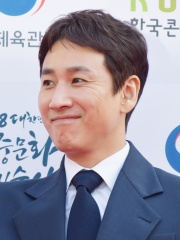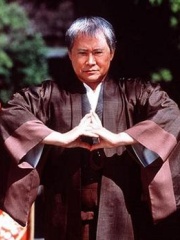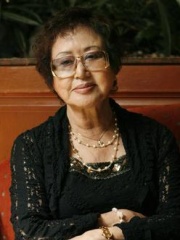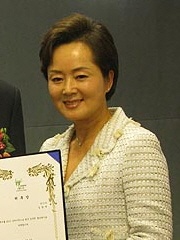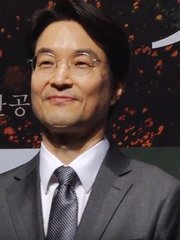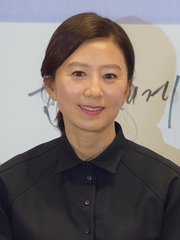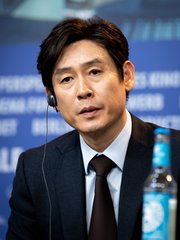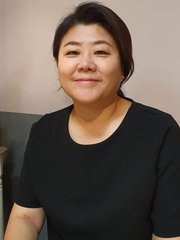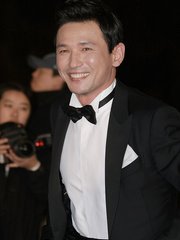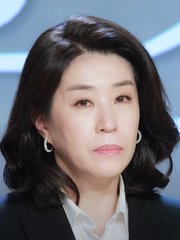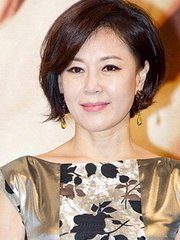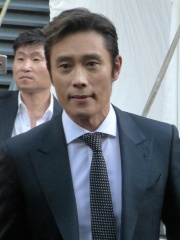
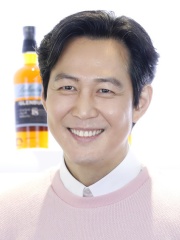


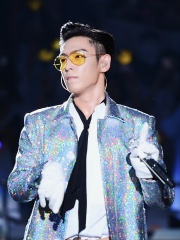

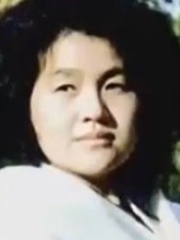

The Most Famous
ACTORS from South Korea
This page contains a list of the greatest South Korean Actors. The pantheon dataset contains 13,578 Actors, 529 of which were born in South Korea. This makes South Korea the birth place of the 5th most number of Actors behind India, and Canada.
Top 10
The following people are considered by Pantheon to be the top 10 most legendary South Korean Actors of all time. This list of famous South Korean Actors is sorted by HPI (Historical Popularity Index), a metric that aggregates information on a biography's online popularity. Visit the rankings page to view the entire list of South Korean Actors.

1. Lee Byung-hun (b. 1970)
With an HPI of 68.15, Lee Byung-hun is the most famous South Korean Actor. His biography has been translated into 41 different languages on wikipedia.
Lee Byung-hun (Korean: 이병헌; born July 12, 1970) is a South Korean actor. He has received acclaim for his work in a wide range of genres, most notably Joint Security Area (2000); A Bittersweet Life (2005); The Good, the Bad, the Weird (2008); I Saw the Devil (2010); Masquerade (2012); and the television series All In (2003), Iris (2009), Mr. Sunshine (2018), and Our Blues (2022). His other notable South Korean films include Inside Men (2015), Master (2016), Ashfall (2019), The Man Standing Next (2020), and No Other Choice (2025). In the United States, he is known for portraying Storm Shadow in G.I. Joe: The Rise of Cobra (2009) and its sequel G.I. Joe: Retaliation (2013), and starring alongside Bruce Willis in Red 2 (2013). He portrayed T-1000 in Terminator Genisys (2015), Billy Rocks in The Magnificent Seven (2016) and Gwi-Ma from KPop Demon Hunters (2025). He appeared in a recurring role as the Front Man in season 1 and as part of the main cast of seasons 2 and 3 of the Netflix hit survival series Squid Game (2021–2025). Lee has been named Gallup Korea's Film Actor of the Year in 2012 and Gallup Korea's Television Actor of the Year in 2018. He was also the first South Korean actor to present an Oscar at the annual Academy Awards in Los Angeles and is a member of the Academy of Motion Picture Arts and Sciences. Lee and Ahn Sung-ki were the first South Korean actors to imprint their hand and foot prints on the forecourt of Grauman's Chinese Theatre in Hollywood, Los Angeles.

2. Lee Jung-jae (b. 1972)
With an HPI of 67.03, Lee Jung-jae is the 2nd most famous South Korean Actor. His biography has been translated into 43 different languages.
Lee Jung-jae (Korean: 이정재; born December 15, 1972) is a South Korean actor, filmmaker, and businessman. Considered one of South Korea's most successful actors, he has received numerous accolades, including a Primetime Emmy Award, a Screen Actors Guild Award, a Critics' Choice Television Award, six Baeksang Arts Awards, in addition to nominations for a Golden Globe Award and a Gotham Award. Aside from his acting career, Lee is also a businessman, having launched a chain of restaurants in Seoul, as well as founding several businesses including the development company Seorim C&D. He owns several of his businesses with fellow actor and close friend Jung Woo-sung. Born in Seoul, Lee debuted as a fashion model, then began his acting career on television, notably in the drama Sandglass (1995). After his acting breakthrough in An Affair (1998), Lee's film career took off. He has starred in a variety of film genres, among them dramas such as City of the Rising Sun (1999), romantic films Il Mare (2000) and Last Present (2001), well-known comedies such as Oh! Brothers (2003), action films Typhoon (2005) and Deliver Us from Evil (2020), thrillers The Housemaid (2010) and New World (2013), heist film The Thieves (2012), and espionage films Assassination (2015), Operation Chromite (2016) and Hunt (2022). He won Best Supporting Actor at the 50th Baeksang Arts Awards for his role in The Face Reader (2013). In 2021, Lee gained widespread international fame for his role as Seong Gi-hun, the main protagonist of Netflix's survival drama Squid Game. For his performance in the show's first season, he was nominated for numerous accolades, including the Critics' Choice Television Award for Best Actor in a Drama Series, the Golden Globe Award for Best Actor – Television Series Drama, the Primetime Emmy Award for Outstanding Lead Actor in a Drama Series and the Screen Actors Guild Award for Outstanding Performance by a Male Actor in a Drama Series, making him the first male actor from Asia and Korea to receive individual nominations in those categories across all four awards shows, with his win for the latter two also making history. His season 2 and 3 portrayals were more mixed, with critics feeling his character's actions were frustrating and made little sense. Despite these criticisms, Lee has been praised for his ability to shift from a lighthearted character to a darker one in the second and third seasons. In December 2021, he was selected as Gallup Korea's Film Actor of the Year. In 2024, he is listed among the most impactful Asians A100 list by Gold House.

3. Ma Dong-seok (b. 1971)
With an HPI of 66.67, Ma Dong-seok is the 3rd most famous South Korean Actor. His biography has been translated into 35 different languages.
Lee Dong-seok (Korean: 이동석; born March 1, 1971), better known by the stage names Ma Dong-seok (마동석) and Don Lee, is a South Korean and American actor and film producer based in South Korea. He gained early recognition for his supporting roles in Nameless Gangster: Rules of the Time (2012) and The Neighbor (2012). Ma rose to prominence with his breakout performance in Train to Busan (2016), where he played a tough yet compassionate survivor, earning widespread acclaim. He cemented his status as a leading action star with The Outlaws (2017), in which he portrayed the relentless detective Ma Seok-do, a role he reprised in the highly successful The Roundup film series. His subsequent leading roles include Along with the Gods: The Last 49 Days (2018), The Gangster, the Cop, the Devil (2019), The Bad Guys: Reign of Chaos (2019), Start-Up (2019), and Ashfall (2019). In 2021, Ma made his Hollywood debut in the Marvel Cinematic Universe film Eternals, which further expanded his global recognition. He remains one of South Korea's most bankable stars and was named Gallup Korea's Film Actor of the Year in 2018, 2023, and 2024.

4. Lee Min-ho (b. 1987)
With an HPI of 66.19, Lee Min-ho is the 4th most famous South Korean Actor. His biography has been translated into 76 different languages.
Lee Min-ho (Korean: 이민호, born June 22, 1987) is a South Korean actor and singer. He gained widespread fame with his role as Gu Jun-pyo in the television series Boys Over Flowers (2009), which also earned him the Baeksang Arts Award for Best New Actor. His other notable works are television series City Hunter (2011), The Heirs (2013), The Legend of the Blue Sea (2016), and The King: Eternal Monarch (2020), as well as the action thriller film Gangnam Blues (2015). In 2022, he starred in the Apple TV+ period drama Pachinko based on the novel of the same name. The success of Lee's television career established him as a top hallyu star. He became the first Korean celebrity to have a wax figure made in his image at Madame Tussauds, with figures being unveiled in Shanghai in 2013, and Hong Kong in 2014.
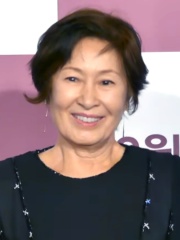
5. Kim Hye-ja (b. 1941)
With an HPI of 66.10, Kim Hye-ja is the 5th most famous South Korean Actor. Her biography has been translated into 18 different languages.
Kim Hye-ja (Korean: 김혜자; born October 25, 1941) is a South Korean actress and humanitarian. Best known to South Korean audiences as the archetypal mother figure in popular television series such as Country Diaries (1980–2002), What Is Love? (1991), My Mother's Sea (1993), and Roses and Beansprouts (1999). Kim drew international critical acclaim in the noir thriller Mother (2009), The Light in Your Eyes (2019), Our Blues (2022) and Heavenly Ever After (2025).

6. T.O.P (b. 1987)
With an HPI of 65.91, T.O.P is the 6th most famous South Korean Actor. His biography has been translated into 37 different languages.
Choi Seung-hyun (Korean: 최승현; born November 4, 1987), known professionally as T.O.P, is a South Korean rapper, musician, philanthropist and actor. He performed as an underground rapper before joining the record label YG Entertainment and debuted as the lead rapper of the boy band BigBang in 2006. The group became one of the best-selling groups of all time in Asia and one of the best-selling boy bands in the world. In 2010, while the group was on hiatus, T.O.P and G-Dragon collaborated to release the album, GD & TOP. As a solo rapper, he has released two digital singles, "Turn It Up" (2010) and "Doom Dada" (2013), that have peaked at number two and four, respectively, on the Gaon Digital Chart. T.O.P made his acting debut in 2007 through the TV series I Am Sam (2007), followed by Iris (2009) and the TV movie Nineteen (2009). He made his film debut with 71: Into the Fire (2010), for which he received praise and won multiple accolades including Best New Actor at the 2010 Blue Dragon Film Awards and the 2011 Baeksang Arts Awards. Subsequently, he garnered lead roles in the films Commitment (2013), for which he was awarded 'New Asian Actor of the Year' at the Busan International Film Festival and Tazza: The Hidden Card (2014). In 2024, T.O.P portrayed Thanos in the second season of the Netflix dystopian survival thriller series Squid Game.

7. Song Joong-ki (b. 1985)
With an HPI of 65.88, Song Joong-ki is the 7th most famous South Korean Actor. His biography has been translated into 68 different languages.
Song Joong-ki (Korean: 송중기; born September 19, 1985) is a South Korean actor who primarily works in television. He rose to fame in the historical coming-of-age drama Sungkyunkwan Scandal (2010) and the variety show Running Man (2010–2011). Since then, he has played diverse roles in the television series The Innocent Man (2012), Descendants of the Sun (2016), Vincenzo (2021), and Reborn Rich (2022); as well as the films A Werewolf Boy (2012), The Battleship Island (2017), and Space Sweepers (2021). Success of his television dramas have established him as one of the top hallyu stars. His accolades include two Baeksang Arts Awards, one Buil Film Award and two Blue Dragon Film Awards. Since 2012, he has appeared in Forbes Korea Power Celebrity 40 six times, being in the top ten four times. He was named Gallup Korea's Television Actor of the Year in 2012 and 2017.

8. Song Hye-rim (1937 - 2002)
With an HPI of 65.74, Song Hye-rim is the 8th most famous South Korean Actor. Her biography has been translated into 18 different languages.
Song Hye-rim (Korean: 성혜림; 24 January 1939 – 18 May 2002) was a North Korean actress, best known for being the one-time favored mistress of Kim Jong Il.

9. Gong Yoo (b. 1979)
With an HPI of 64.20, Gong Yoo is the 9th most famous South Korean Actor. His biography has been translated into 45 different languages.
Gong Ji-cheol (Korean: 공지철; born July 10, 1979), known professionally as Gong Yoo (공유), is a South Korean actor. He is best known for his starring roles in the television series Coffee Prince (2007), Guardian: The Lonely and Great God (2016–2017), the Netflix series Squid Game (2021–2025), and the films Silenced (2011), The Suspect (2013), Train to Busan (2016), and The Age of Shadows (2016).

10. Kim Soo-hyun (b. 1988)
With an HPI of 64.09, Kim Soo-hyun is the 10th most famous South Korean Actor. His biography has been translated into 50 different languages.
Kim Soo-hyun (Korean: 김수현; born February 16, 1988) is a South Korean actor. He is the recipient of five Baeksang Arts Awards, two Grand Bell Awards and one Blue Dragon Film Award. Kim made his television debut in 2007 with the family sitcom Kimchi Cheese Smile following a few theatrical performances. He went on to star in television dramas Dream High (2011), Moon Embracing the Sun (2012), as well as in the top-grossing films The Thieves (2012) and Secretly, Greatly (2013). Kim became a top hallyu star with the fantasy series My Love from the Star (2013–14), followed by the variety drama The Producers (2015). He enlisted in the mandatory military service in October 2017, and returned to acting with It's Okay to Not Be Okay (2020). Following that, he starred in One Ordinary Day (2021) and Queen of Tears (2024). He was selected as Gallup Korea's Television Actor of the Year in 2014.
People
Pantheon has 529 people classified as South Korean actors born between 1926 and 2006. Of these 529, 507 (95.84%) of them are still alive today. The most famous living South Korean actors include Lee Byung-hun, Lee Jung-jae, and Ma Dong-seok. The most famous deceased South Korean actors include Song Hye-rim, Lee Sun-kyun, and Soon-Tek Oh. As of April 2024, 114 new South Korean actors have been added to Pantheon including Han Suk-kyu, Choi Ji-woo, and Kim Hee-ae.
Living South Korean Actors
Go to all RankingsLee Byung-hun
1970 - Present
HPI: 68.15
Lee Jung-jae
1972 - Present
HPI: 67.03
Ma Dong-seok
1971 - Present
HPI: 66.67
Lee Min-ho
1987 - Present
HPI: 66.19
Kim Hye-ja
1941 - Present
HPI: 66.10
T.O.P
1987 - Present
HPI: 65.91
Song Joong-ki
1985 - Present
HPI: 65.88
Gong Yoo
1979 - Present
HPI: 64.20
Kim Soo-hyun
1988 - Present
HPI: 64.09
HoYeon Jung
1994 - Present
HPI: 62.20
Hyun Bin
1982 - Present
HPI: 62.11
Song Hye-kyo
1981 - Present
HPI: 61.61
Deceased South Korean Actors
Go to all RankingsSong Hye-rim
1937 - 2002
HPI: 65.74
Lee Sun-kyun
1975 - 2023
HPI: 63.51
Soon-Tek Oh
1932 - 2018
HPI: 62.29
Choi Eun-hee
1926 - 2018
HPI: 60.37
Kim Jong-hyun
1990 - 2017
HPI: 59.49
Sulli
1994 - 2019
HPI: 59.06
Choi Jin-sil
1968 - 2008
HPI: 58.99
Kim Young-ae
1951 - 2017
HPI: 58.64
Kim Sae-ron
2000 - 2025
HPI: 56.74
Goo Hara
1991 - 2019
HPI: 55.81
Song Jae-rim
1985 - 2024
HPI: 55.46
Moonbin
1998 - 2023
HPI: 55.36
Newly Added South Korean Actors (2025)
Go to all RankingsHan Suk-kyu
1964 - Present
HPI: 56.85
Choi Ji-woo
1975 - Present
HPI: 56.43
Kim Hee-ae
1967 - Present
HPI: 55.49
Park Sung-hoon
1985 - Present
HPI: 54.31
Sul Kyung-gu
1967 - Present
HPI: 53.79
Lee Jung-eun
1970 - Present
HPI: 53.62
Hwang Jung-min
1970 - Present
HPI: 53.19
Kim Sung-ryung
1967 - Present
HPI: 53.17
Kim Mi-kyung
1963 - Present
HPI: 53.13
Byeon Woo-seok
1991 - Present
HPI: 53.10
Yum Jung-ah
1972 - Present
HPI: 52.92
Cha Hwa-yeon
1960 - Present
HPI: 52.38
Overlapping Lives
Which Actors were alive at the same time? This visualization shows the lifespans of the 20 most globally memorable Actors since 1700.




